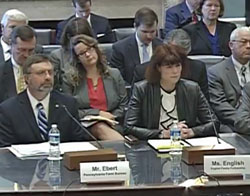 Earlier this week, three Farm Bureau members testified before the House Agriculture Subcommittee on Conservation and Forestry regarding the involvement of the Environmental Protection Agency (EPA) in the ongoing Chesapeake Bay cleanup. Pennsylvania Farm Bureau President Richard Ebert, former Ohio Farm Bureau President Terry McClure, and Florida Farm Bureau member Kate English, all testified before the subcommittee that they believe the EPA has failed to explain its expectations in the cleanup, and stated concerns that the organization is spreading false information about farming.
Earlier this week, three Farm Bureau members testified before the House Agriculture Subcommittee on Conservation and Forestry regarding the involvement of the Environmental Protection Agency (EPA) in the ongoing Chesapeake Bay cleanup. Pennsylvania Farm Bureau President Richard Ebert, former Ohio Farm Bureau President Terry McClure, and Florida Farm Bureau member Kate English, all testified before the subcommittee that they believe the EPA has failed to explain its expectations in the cleanup, and stated concerns that the organization is spreading false information about farming.
“Despite my four-year degree in animal science from a well-known and respected university and 34 years of farming while implementing modern technologies, I don’t understand EPA’s science,” Ebert said. “And no farmer can legitimately comprehend and respond to the reams of academic analyses that have been produced through these meetings and continue to perform the tasks needed to run his or her farm business.”
McClure noted that Ohio farmers work hard to reduce runoff of excess phosphorous and nitrogen from their farms.
“Farmers have invested tens of millions of dollars of their own money in establishing conservation practices on their farms,” McClure said. “Between 2006 and 2012, they have voluntarily reduced phosphorous applications in the Western Lake Erie Basin by more than 13 million pounds. As farmers are stepping up to implement conservation practices now, they are committed to finding additional solutions in the future.”
The controversial Waters of the United States (WOTUS) rule, which was finalized last May despite vehement opposition from the agriculture industry, was also brought up during testimony.
“The rule not only expands the regulatory footprint for farming and increases the uncertainty we battle daily, but it also lacks peer-reviewed sound science,” English said. “These regulations appear instead to be based on public opinion and social media trends rather than facts and science. The result is a highly unpredictable regulatory environment and uncontrolled costs when faced with compliance based on a moving target rather than a rational, science-based goal.”
Testimony of Richard Ebert
Testimony of Terry McClure
Testimony of Kate English

